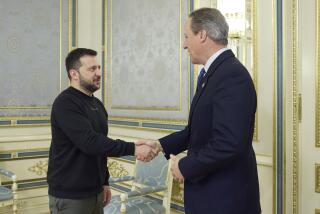British, Pakistani leaders pledge to ‘stand together’
- Share via
Reporting from London — Britain and Pakistan sought to put a rocky week in their relationship behind them as their leaders met Friday to forge what they described as a strategic partnership based on an unbreakable bond between the two nations.
British Prime Minister David Cameron and Pakistani President Asif Ali Zardari said the shared goals of expanding trade and fighting terrorism would continue to unite their countries, regardless of diplomatic hiccups along the way.
“It’s a friendship which will never break, no matter what happens,” Zardari said after a meeting with Cameron at Chequers, the British premier’s official country residence. “Storms will come and storms will go, and Pakistan and Britain will stand together and face all the difficulties with dignity.”
Zardari’s comments were an allusion to a rough patch in relations between London and Islamabad that was triggered by a visit Cameron paid to Pakistan’s archrival, India, last week.
While in India, Cameron warned Pakistan not to “look both ways” in its dealings with the West and with the Taliban in Afghanistan, a reference to the double-dealing that many analysts say Islamabad has carried on in the region for years. The British leader also seemed to suggest that Pakistan was not doing enough to fight terrorism.
The comments infuriated Islamabad, which promptly summoned the British ambassador in protest and canceled a visit to London by the Pakistani intelligence chief.
Zardari then roused the ire of Britain and the U.S. this week by telling a French newspaper that the West was losing the war against the Taliban because it had failed to win over Afghans’ hearts and minds.
Both Cameron and Zardari were eager to set aside those contretemps and present a united front Friday.
Calling the nations’ relationship “unbreakable,” Cameron told reporters that Britain and Pakistan would continue to “work together to combat terrorism … whether it is keeping troops safe in Afghanistan or keeping people safe on the streets of Britain.”
In a joint statement issued later, Cameron “recognized the sacrifices made by Pakistan’s military, civil law enforcement agencies and people in fighting violent extremism and militancy.”
The two leaders also discussed the devastating monsoons that have killed more than 1,000 people in Pakistan and left huge swaths of the country underwater. Britain has pledged $16 million in immediate aid.
For both men, Friday’s meeting was as much about quieting domestic criticism as pursuing foreign diplomacy.
Zardari faces criticism for going ahead with his visit to Britain in spite of the catastrophic floods at home. His aides say it was important to get relations with London back on track, and will probably tout as a victory Cameron’s statement recognizing Pakistani sacrifices in the battle against terrorism.
Cameron, in office just three months, hopes that the smiles and pledges of eternal friendship at Chequers will help blunt criticism that he is too green and gaffe-prone on the world stage.
In the last 10 days alone, besides his comments on Pakistan, he offended Israel by calling the Gaza Strip a giant “prison camp” and mistakenly declared that Iran possessed a nuclear weapon. Analysts say Tehran is trying to develop such a weapon but is not there yet. Iran insists its nuclear development program is solely for civilian energy purposes.
Cameron maintains that he is simply continuing his habit of speaking plainly and forthrightly. But a spokesman for the opposition Labor Party said the British leader had “two right feet, both of them firmly planted in his mouth.”
More to Read
Sign up for Essential California
The most important California stories and recommendations in your inbox every morning.
You may occasionally receive promotional content from the Los Angeles Times.











